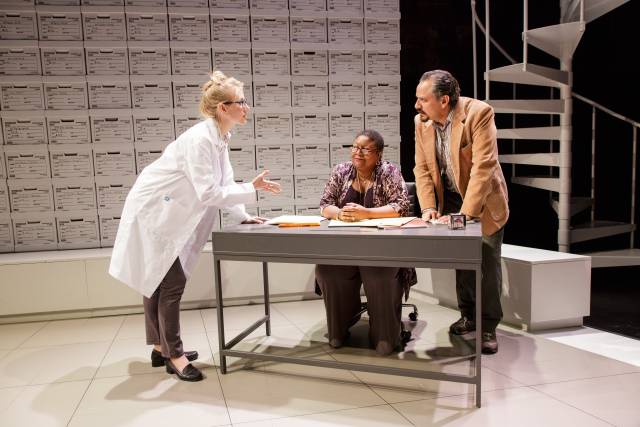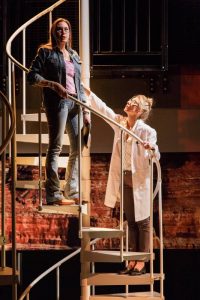

In Informed Consent, playwright Deborah Zoe Laufer asks us to hold up religion and myth against science as she tackles one of the life's largest enduring dilemmas: are there dangers in the relentless pursuit of knowledge?
To complement months of research on both genetic science and Native American customs, Laufer mines a key element of the plot from an infamous legal battle that took place in 1990, in which the Havasupai Tribe from the Grand Canyon successfully sued Arizona State University for misusing blood obtained to study the alarmingly high rates of diabetes in the community, conducting other research without specifically gaining consent. Most devastatingly for the tribe, results of unauthorized experiments on migratory patterns contradicted the tribe's long held creation myths.
Informed Consent, presented by Primary Stages and Ensemble Studio Theatre/Alfred P. Sloan Foundation Science and Technology Project, tells this story through Dr. Jillian Elliot, a brilliant and zealously driven genetic anthropologist working at "a large university in Arizona." Framed by the simple conceit of Dr. Elliot writing a letter to her young daughter, the play's entire structure is a resourceful, clever, metatheatrical rumination on storytelling and memory, one which strikes a particularly poignant chord as filtered through the knowledge that Elliot is creating a record for posterity that she can never personally recount -- she carries the gene for early onset Alzheimer's, and the damage has already begun. A chorus of four actors help Elliot recount elements of her life, from meeting her husband to embarking on her research with the Havasupai Tribe.
Wilson Chin has designed a set that is sparse and clinical in all white, with four white spiral staircases flanking the stage like large looping strands of DNA and huge stacks of white cardboard storage boxes rising to the ceiling. The lighting design by Matthew Richards transforms the space from Canyon to home to office.

Though the play has moments of tragedy, it is ultimately played with warmth, levity, and self-awareness, driven in part by the terrific physical performances of a refreshingly diverse cast. Though serious in his embodiment of Ken, the social anthropologist who assigns Jillian to the research, Jesse J. Perez is hysterical as a little girl and as a dramatic young mother. As Dean Hagan and a host of others, Myra Lucretia Taylor shifts easily between roles, and as Dr. Elliot's wife Graham, Pun Bandhu carries the charisma of a devoted, caring husband and father we rarely see depicted on stage or screen. The character switching is abrupt and occasionally absurd, but it is never once confusing thanks to the subtle mastery of the characters and caricatures from the simplest facial adjustment or gesture.
For Elliot, played with a deadpan mastery by Tina Benko, there is no truth above science, and knowledge is the ultimate form of power. Driven by her underlying hope of finding a cure for Alzheimer's, which is heightened by her fear that her daughter may carry the gene, Elliot, clear-eyed, manipulates a non-native English speaking population, refusing to believe that anyone would stand in the way of the potential for scientific breakthrough. Endearing in her bluntness and passion ("We're all cousins!" she shouts to us again and again in a TED Talk-style lecture), her beliefs comes crashing against the equally strong-willed Arella, played with an impeccably commanding presence by DeLanna Studi, a member of the Cherokee Nation, a woman who was encouraged by the social anthropologist overseeing Dr. Elliot to attend college, and who now acts as an interpreter and intermediary between her tribe and the outside world.
"Every tribe has its own truth," Arella tells Jillian. No, Jillian insists, "every tribe has its own story, there is only one truth." In this exchange lies the central dilemma of a play that is brilliant, complex, and ultimately challenging in its refusal to provide easy solutions, questioning the very idea of truth, and whether there can ever possibly be one version.